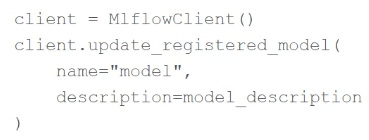DATABRICKS-MACHINE-LEARNING-PROFESSIONAL Online Practice Questions and Answers
A data scientist would like to enable MLflow Autologging for all machine learning libraries used in a notebook. They want to ensure that MLflow Autologging is used no matter what version of the Databricks Runtime for Machine Learning is
used to run the notebook and no matter what workspace-wide configurations are selected in the Admin Console.
Which of the following lines of code can they use to accomplish this task?
A. mlflow.sklearn.autolog()
B. mlflow.spark.autolog()
C. spark.conf.set(“autologging”, True)
D. It is not possible to automatically log MLflow runs.
E. mlflow.autolog()
Which of the following deployment paradigms can centrally compute predictions for a single record with exceedingly fast results?
A. Streaming
B. Batch
C. Edge/on-device
D. None of these strategies will accomplish the task.
E. Real-time
A machine learning engineer is converting a Hyperopt-based hyperparameter tuning process from manual MLflow logging to MLflow Autologging. They are trying to determine how to manage nested Hyperopt runs with MLflow Autologging. Which of the following approaches will create a single parent run for the process and a child run for each unique combination of hyperparameter values when using Hyperopt and MLflow Autologging?
A. Starting a manual parent run before calling fmin
B. Ensuring that a built-in model flavor is used for the model logging
C. Starting a manual child run within the objective_function
D. There is no way to accomplish nested runs with MLflow Autologging and Hyperopt
E. MLflow Autologging will automatically accomplish this task with Hyperopt
A machine learning engineer has deployed a model recommender using MLflow Model Serving. They now want to query the version of that model that is in the Production stage of the MLflow Model Registry. Which of the following model URIs can be used to query the described model version?
A. https://
B. The version number of the model version in Production is necessary to complete this task.
C. https://
D. https://
E. https://
A machine learning engineering team has written predictions computed in a batch job to a Delta table for querying. However, the team has noticed that the querying is running slowly. The team has already tuned the size of the data files. Upon
investigating, the team has concluded that the rows meeting the query condition are sparsely located throughout each of the data files.
Based on the scenario, which of the following optimization techniques could speed up the query by colocating similar records while considering values in multiple columns?
A. Z-Ordering
B. Bin-packing
C. Write as a Parquet file
D. Data skipping
E. Tuning the file size
A machine learning engineer is migrating a machine learning pipeline to use Databricks Machine Learning. They have programmatically identified the best run from an MLflow Experiment and stored its URI in the model_uri variable and its Run ID in the run_id variable. They have also determined that the model was logged with the name "model". Now, the machine learning engineer wants to register that model in the MLflow Model Registry with the name "best_model". Which of the following lines of code can they use to register the model to the MLflow Model Registry?
A. mlflow.register_model(model_uri, "best_model")
B. mlflow.register_model(run_id, "best_model")
C. mlflow.register_model(f"runs:/{run_id}/best_model", "model")
D. mlflow.register_model(model_uri, "model")
E. mlflow.register_model(f"runs:/{run_id}/model")
A machine learning engineer is manually refreshing a model in an existing machine learning pipeline. The pipeline uses the MLflow Model Registry model "project". The machine learning engineer would like to add a new version of the model
to "project".
Which of the following MLflow operations can the machine learning engineer use to accomplish this task?
A. mlflow.register_model
B. MlflowClient.update_registered_model
C. mlflow.add_model_version
D. MlflowClient.get_model_version
E. The machine learning engineer needs to create an entirely new MLflow Model Registry model
Which of the following Databricks-managed MLflow capabilities is a centralized model store?
A. Models
B. Model Registry
C. Model Serving
D. Feature Store
E. Experiments
A machine learning engineer wants to programmatically create a new Databricks Job whose schedule depends on the result of some automated tests in a machine learning pipeline. Which of the following Databricks tools can be used to programmatically create the Job?
A. MLflow APIs
B. AutoML APIs
C. MLflow Client
D. Jobs cannot be created programmatically
E. Databricks REST APIs
A machine learning engineering manager has asked all of the engineers on their team to add text descriptions to each of the model projects in the MLflow Model Registry. They are starting with the model project "model" and they'd like to add
the text in the model_description variable.
The team is using the following line of code:

Which of the following changes does the team need to make to the above code block to accomplish the task?
A. Replace update_registered_model with update_model_version
B. There no changes necessary
C. Replace description with artifact
D. Replace client.update_registered_model with mlflow
E. Add a Python model as an argument to update_registered_model